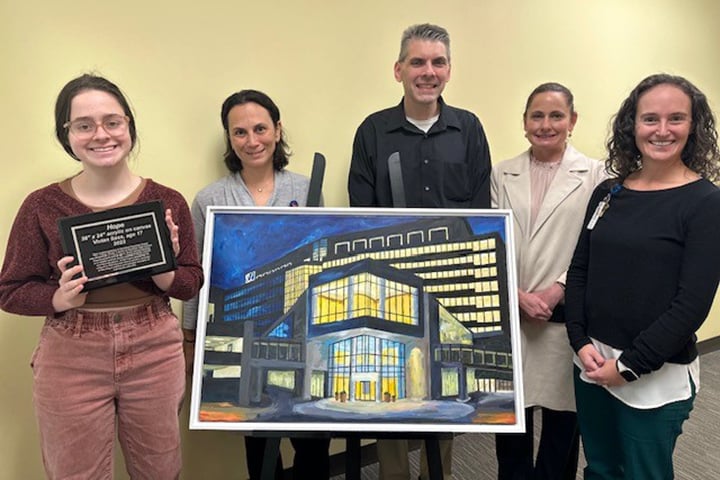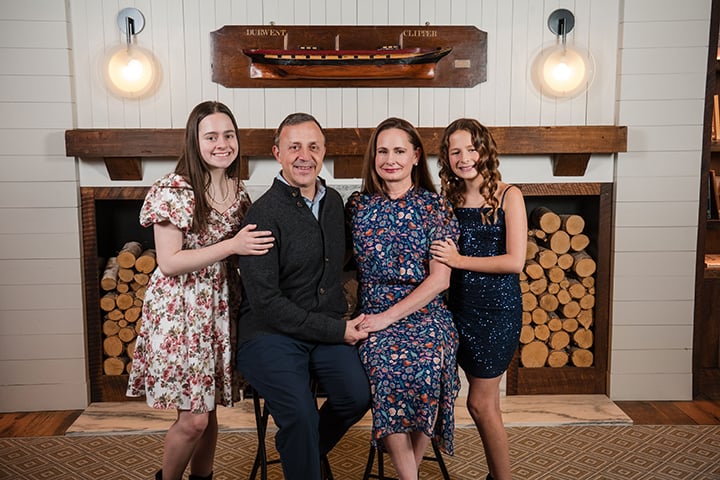Fund for autism research at UMass Chan aims to improve clinical care
Meghan Banik Sass, MD’03, R’05, F’09, and Ugyen Sass establish endowment in honor of daughter Vivian
Date Posted: Monday, May 13, 2024
Upon entering The Center for Autism and Neurodevelopmental Disorders (CANDO), visitors are treated to a striking piece of original artwork. Titled “Hope,” the acrylic on canvas painting features a prominent building at UMass Chan Medical School with dramatically contrasting colors, bold lines and sharply rendered architectural features. It reflects the prevailing style of the artist, Vivian Sass, age 17, who donated the painting in November 2023. The description of the painting reads:
This custom painting of the Albert Sherman Center was donated by Vivian, a senior at Needham High School. Diagnosed with ASD [Autism Spectrum Disorder] at age 4, Vivian started painting as a toddler and has always painted brightly colored architectural pieces. Vivian hopes displaying her artwork in ASD-focused clinics will be a reminder of the unique abilities and valuable strengths of individuals with ASD.

The painting is one of many that Vivian has donated to nonprofit organizations and programs such as CANDO. Her generous spirit reflects that of her parents, Meghan Banik Sass, MD’03, R’05, F’09, and Ugyen Sass, who recently endowed a fund for autism research at UMass Chan on behalf of their family, which includes daughter Rosie, age 13, along with Vivian.
The Sass family’s growing connections to UMass Chan began when Meghan was a medical student. After earning her bachelor’s degree at Tulane University, Meghan returned home to Massachusetts, where her family has strong roots that include service to the commonwealth—both Meghan’s father and brother are Massachusetts state troopers—so the state’s public medical school was the natural choice.
Reflecting on her time at UMass Chan, which included the MD program, residency, and fellowship, Meghan cites the people, both students and faculty, as a key differentiator.
“The school attracts bright, exceptional, authentic people who create a healthy work and learning environment. Everyone was very close-knit and supportive, like an extended family,” said Meghan, who is an active member of the Class of 2003, serving as class chair and representative for the past two reunions.
Meghan stepped away from her role as the sole endocrinologist at a community hospital soon after Vivian was diagnosed with autism at age 4. Amid the challenges, Meghan and Ugyen embraced Vivian’s talents, including painting, which provided a tool for social-emotional learning and empowered Vivian to channel her incredibly high energy into a creative pursuit that others could appreciate.
“Vivian has always found comfort in painting. In her busy preschool classroom, she painted so much I started using her artwork as wrapping paper,” said Meghan.
Today, Vivian is an engaged student at Needham High School, where the enriching environment and offerings such as Advanced Placement art and physics are well-matched to her drive and talent. Currently a senior, she is looking ahead to college and plans to major in architecture. Described by her mom as outgoing, creative and intelligent, Vivian is giving with both her interests and time. Alongside the thoughtful donations of her artwork, she recently started a math tutoring program for neurodivergent kids, where she shares her exceptional ability to visualize and describe math concepts.
While Meghan observes that both acceptance of and support for children with autism have progressed in the past decade, there is still a lot of work to do, including the improvement of diagnostic tools.
“Early diagnosis is key,” she said. Support for siblings is another area that Meghan feels needs development. “Neurotypical siblings live with a lot of disruption. I think more awareness around how autism impacts the whole family is important.”
After several years of generously supporting the Hudson Hoagland Society, the leadership giving society of individuals who support biomedical research at UMass Chan, Meghan and Ugyen decided it was time to support the Medical School in a more substantial way. Given their personal connection to autism, as well as both medicine and research—Meghan recently earned a master’s degree in clinical research at the Massachusetts College of Pharmacy and Health Sciences—supporting autism research at UMass Chan was a clear choice.
As a flexible source of funding, the Sass Family Fund for Autism enables a physician with a focus on autism spectrum disorder to pursue new or continued research ideas that lead to improved clinical care.
“We’re grateful for the Sass family’s generous support, which has the potential to impact children with autism and their families in profound ways,” said Jean Frazier, MD, the Robert M. and Shirley S. Siff Chair in Autism, professor of psychiatry and pediatrics and executive director of the Eunice Kennedy Shriver Center (of which CANDO is a program). “Private, flexible funding like this drives innovation that otherwise might not be possible.”
